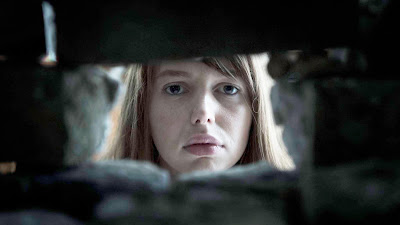Well before the nomadic lead character in “Transit” lodges a place in our understanding, the movie observes him in a grind more akin to that of a noir protagonist: always in the wrong place at the wrong time. This trend is established in the first scene, during a dialogue exchange in which he is persuaded to deliver letters to an enigmatic source for a monetary reward. The situation: a provocative writer is in hiding as the German occupation nears Paris, and it would make more sense for a stranger to show up at his hotel carrying parcels than a known rebel who might attract the wrong attention. The letters, we learn, consist of information that would allow him to leave France (one indicates he has a wife beckoning him to meet her in Marseilles). On arrival at his room, however, he discovers the writer has committed suicide in the bathtub, leaving behind an unfinished manuscript (among other things) that he is compelled to take. And so he returns to the streets, now aimless as the Germans move in towards frightened immigrants, with no established identity to defend him… other than that of his deceased source, whose passport he has chosen to safeguard. After stowing away on a train with a wounded friend and narrowly escaping inspection, he arrives at the port and is mistaken for the deceased scribe, leading to a moral quandary: can his conscience allow him to play along in order to escape the fascists? Or will the arrival of a strange beautiful woman complicate the matter further, especially when he discovers that she is the wife of the man he is impersonating?
Wednesday, March 27, 2019
Tuesday, March 12, 2019
The Hole in the Ground / ** (2019)
Some horror movies are content to let the terror sneak up on you. Others may show the characters wander into it almost blindly, usually compelled by the dramatic currents of grief or curiosity. A rare few will jump head-first into the danger, because without fully understanding motives or behaviors first, we can resent a film for not providing adequate breathing time to lodge anything into a plausible context. “The Hole in the Ground” shows a new director audaciously planting himself in the third distinction, where he sets himself up for a plethora of narrative dilemmas by, basically, skipping over the development of his would-be victims. The key moment: a mother and her son are driving in the wilderness and nearly run down an old woman standing aimlessly in the road, her withered face concealed behind a dark robe. Briefly, after being checked on by the concerned driver, she turns towards the vehicle and catches a glimpse of the boy. The soundtrack emphasizes the impulse, indicating something ominous. What does it indicate? How will it affect the ones who nearly ran her down? These are questions that ought to be reserved for a time after reaching comfort with the important players, who are clearly likable but seem displaced by a melancholy that never has a chance to formulate. In the age of genre pictures that often make their points in overlong passages, here is one that trims off too much and shoehorns it into a space too brief to allow for an adequate understanding.
Wednesday, March 6, 2019
The Happytime Murders / * (2018)
Aren’t we well beyond the point of an idea this absurd? Isn’t there someone, somewhere, high up in the studio system who looks at the mere concept of a movie like this and is willing to ask, “hey, is it really that appealing for moviegoers to show up just to see puppets shouting obscenities and making awkward sex jokes for 90 minutes?” “The Happytime Murders” has the dubious distinction of being the most miscalculated idea for a film in many a moon, a sham of a concept saddled somewhere between obvious and juvenile, with the right mix of desperation thrown in for good measure. That would be all but a minor inconvenience, had it not also been one of the most unfunny comedies of recent years – but by coming across as such, the idea warrants the outright resentment of any who dare experience it. Dwell for a moment on the fact that a director with a background in this genre, two established writers, over a dozen well-known producers and countless talented men and women stood behind the scenes and actually put conscious effort into the material – how were so many willing to be freely associated with a movie that was doomed to unravel their credibility in 90 minutes of laughless, mean-spirited hogwash? The more ambitious onlookers might, I suppose, find entertainment in imagining how disastrous the early story conferences were, or if anyone sitting at the table was conscious long enough to wonder whether they were too caught up in cynicism to sense their integrity slipping.
Subscribe to:
Posts (Atom)



